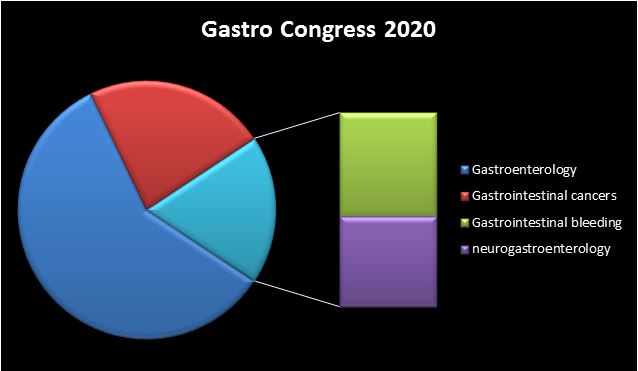About Us
Conference Series LLC Ltd invites all the participants from all over the world to attend “4th International conference on Digestive and Metabolic Disease” during August 19-20, 2021 in Singapore City, Singapore
Digestive Disease 2021 conference theme is “To Explore the research in Gastroenterology Medicine and Liver Disease” which aims to provide a platform for science researchers, Scientists, Surgeons, Doctors, physician, and academicians to exchange and share their experiences and research results about all aspects of Digestive and Metabolic Disease.
Theme: “To explore the research in Gastroenterology Medicine and Liver Disease”
Supporting Journals:
Journal of Gastrointestinal & Digestive System (Journal Impact Factor - 0.21)
Journal of Clinical Gastroenterology Journal (Journal Impact Factor - 0.167)
Journal of Global Digestive Diseases (Journal Impact Factor - 0.212)
Details of Digestive Disease 2021, Dubai, UAE
|
Conference Name
|
Place
|
Date
|
|
Digestive Disease
|
Singapore City, Singapore.
|
August 19-20, 2021
|
WHY TO ATTEND
With members from around the world focused on Digestive and Metabolic Disease this is your best opportunity to reach the largest assemblage of participants from the universities, colleges, research centres, societies, institutions, labs, associations, communities and Hospitals etc. We want to make a worldwide meet in which data between researchers from the different controls can be effectively traded. The explanation behind bringing the general population at the meetings together is to catalyse empowering trades and connections between experts in different fields, from life science to gastroenterology. It will make new interdisciplinary systems and permit members to trade know-how and data to accomplish speedier and better results.
Digestive Disease 2021 will boost the advanced techniques and various methods for better healthcare management. This conference will provide best platform for the researchers and business leaders to acknowledge recent breakthroughs and invest in the field of Gastroenterology and for a better future.
Target Audience:
-
Gastroenterology and Hepatology Faculties
-
Directors of Gastroenterology and Hepatology Universities
-
Gastro and Hepatology Students
-
Pharmaceutical Industry Mentors and Marketers
-
Gastro and Hepatology Scientists
-
Directors of Medical universities
-
Gastrologist and Hepatology research
-
Exhibitors and Sponsors
Meeting opportunities:
For Researchers and Faculty members:
-
Speaker presentations
-
Poster presentation
-
Symposium hosting
-
Workshop organizing
For Universities, Associations & Societies:
-
Association partnering
-
Collaboration proposals
-
Academic partnering
-
Group participation
For students and Research scholars:
-
Poster competition
-
Young Researcher Forum
-
Student attendee
-
Group registrations
For Business Delegates:
-
Speaker presentations
-
Symposium hosting
-
Book launch event
-
Networking opportunities
-
Audience participation
For Product manufacturers:
-
Exhibitor and Vendor booths
-
Sponsorship opportunities
-
Product launch
-
Workshop organization
-
Scientific partnering
-
Marketing and Networking with clients
Scientific Sessions
Sessions 1: Advances in Digestive Diseases
Progression in the analysis and treatment of gastrointestinal diseases has been outstanding in the running years. Examination is going on new diagnostic strategies and novel therapeutic frameworks for gastresophageal reflux sickness (GERD), pancreatic-biliary and post-surgical issues, Barrett's throat, neuroendocrine tumors and gastrointestinal stromal tumors. In Japan, gastric development is the second driving purpose behind threat passing.
Sessions 2: Gastrointestinal Oncology
Gastrointestinal disease alludes to dangerous states of the gastrointestinal tract (GI tract) and embellishment organs of processing, including the throat, stomach, biliary framework, pancreas, small digestive system, internal organ, rectum and anus. The symptoms are associated to the damaged organ and can include obstruction (leading to difficulty swallowing or defecating), abnormal bleeding or other related problems. The finding regularly requires endoscopy, trailed by biopsy of suspicious tissue. The treatment relies upon the area of the tumor, and additionally the kind of disease cell and whether it has attacked different tissues or spread somewhere else. These components likewise decide the guess.
Sessions 3: Liver diseases & Transplantation
Liver is the largest organ inside your body. It helps your body digest food, store energy, and remove poisons.Indications of liver sickness can differ, however they frequently incorporate swelling of the abdomen and legs, bruising easily, changes in the shade of your stool and urine.The first attempted human liver transplant was performed in 1963 by Dr. Thomas Starzl, although the pediatric patient died intraoperatively due to uncontrolled bleeding. In spite of the improvement of suitable surgical procedures, liver transplantation stayed trial through the 1970s, with one year tolerant survival in the region of 25%. Liver transplantation is now performed at over one hundred centers in the US, as well as numerous centres in Europe and elsewhere.
Sessions 4: Micro biome in Gastrointestinal & Liver
The micro biome comprises all of the genetic material within a microbiota (the entire collection of microorganisms in a specific niche, such as the human gut). This can also be referred to as the metagenome of the microbiota. Liver cirrhosis occurs as a consequence of many chronic liver diseases that are prevalent worldwide. Here we characterize the gut micro biome in liver cirrhosis by comparing 98 patients and 83 healthy control individuals. We manufacture a reference gene set for the accomplice containing 2.69 million genes, 36.1% of which are novel. Quantitative metagenomics reveals 75,245 genes that differ in abundance between the patients and healthy individuals (false discovery rate < 0.0001).
Sessions 5: Gallstones
They aren't generally stones. They're bits of strong material that shape in the gallbladder, a little organ situated under the liver. You won't not know you have them until the point that they obstruct a bile pipe, causing torment that you have to escape. The two fundamental sorts are: Cholesterol stones, Pigment stones.
Sessions 6: Inflammatory Bowel Disease
Inflammatory bowel disease (IBD) represents a group of intestinal disorders that cause prolonged inflammation of the digestive tract. The digestive tract comprises the mouth, esophagus, stomach, small intestine, and large intestine. It’s responsible for breaking down food, extracting the nutrients, and removing any unusable material and waste products. Inflammation anywhere along the digestive tract disrupts this normal process. IBD can be very painful and disruptive, and in some cases, it may even be life-threatening.
Sessions 7: Obesity and Diabetes
Overweight and obesity are defined by an excess accumulation of adipose tissue to an extent that impairs both physical and psychosocial health and well-being. Obesity is considered a health disaster in both developed and developing countries.
Diabetes mellitus (DM) is a chronic disorder that can alter carbohydrate, protein, and fat metabolism. It is caused by the absence of insulin secretion due to either the progressive or marked inability of the β-Langerhans islet cells of the pancreas to produce insulin, or due to defects in insulin uptake in the peripheral tissue. DM is broadly classified under two categories, which include type 1 and type 2 diabetes.
Sessions 8: Stomach and small Bowel Disorder
Bowel obstruction occurs when the normal flow of intraluminal contents is interrupted. Obstruction can be functional (due to abnormal intestinal physiology) or due to a mechanical obstruction, which can be acute or chronic. Advanced small bowel obstruction leads to bowel dilation and retention of fluid within the lumen proximal to the obstruction, while distal to the obstruction, as luminal contents pass, the bowel decompresses
Sessions 9: Hemorrhoids
Hemorrhoids (HEM-uh-roids), also called piles, are swollen veins in your anus and lower rectum, similar to varicose veins. Hemorrhoids have a number of causes, although often the cause is unknown. They may result from straining during bowel movements or from the increased pressure on these veins during pregnancy. Hemorrhoids may be located inside the rectum (internal hemorrhoids), or they may develop under the skin around the anus (external hemorrhoids).
Sessions 10: Colorectal Disease
Together the colon and rectum make up our large intestine; they each play separate and important roles in our digestive process. For that reason, medical disorders that affect this area of the body may be called “colorectal” or “intestinal” disorders. Colorectal conditions range from common and often treatable problems such as chronic constipation, to rare or life-threatening disorders including anal cancer.
Session 11: Pediatric Gastroenterology
If your child has a digestive system, liver, or nutritional problem, a pediatric Gastroenterology has the expertise to treat your child. Digestive, liver, and nutritional problems in children often are quite different from those seen in adults.
Session 12: Neuro-Gastroenterology
Neuro Gastroenterology is a sub specialty of gastroenterology that overlaps with neurology. The enteric nervous system is a collection of neuron's that can function independently of the central nervous system (CNS). This article discusses the neurological manifestations of Gastroenterology disorders as well as significant Gastroenterology manifestations of neurological disorders
Session 13: Gastroenterology & Pregnancy
Pregnancy is a challenging period for the gastroenterologist. Although multiple gastrointestinal complaints may occur during pregnancy (gastroesophageal reflux, constipation, etc.) most of these are mild to moderate, usually managed by the obstetrician, and therefore the gastroenterologist is seldom asked to intervene
Market Research
Digestive Disease conference covers subject relating and to reducing any health problem that occurs in the digestive tract. Conditions may range from mild to serious Intestinal problems, such as polyps and cancer, infections, celiac disease, Crohn disease, ulcerative colitis, diverticulitis, malabsorption, short bowel syndrome, and intestinal ischemia these are the some of the streams covered in the conference.
Scope and Importance:
The main aim of this program will feature local and national speakers with expertise in endoscopy and gastroenterology topics will be covered to educate the broader gastroenterology community and referring physicians regarding management of inflammatory bowel disease in pregnancy, hepatitis B, microscopic colitis, dietary modifications in functional GI disorders, role of cholangioscopy in complex biliary disorders, patient selection for the LINX procedure for GERD, resection of colonic polyps and management of post polypectomy complications.
Economic and Business:
Digestive Diseases Market is expected to grow from USD 17.27 billion in 2016 and reach USD 19.79 billion in 2022, growing at a CAGR of 2.3% during the forecast period. Our industry experts anticipate that within the Digestive diseases market, the GIT Anti-inflammatory drug will grow at the fastest CAGR ranging from 1% to .5%, during the forecast period. Based on the geographic regions, our experts anticipate that Europe will be the fastest-growing segment during the forecast period. The Europe region will grow at a CAGR ranking from 1% to 0.3% by 2022
The Global Universities:
America:
American College of Gastroenterology, USA
American Gastroenterological Association, USA
Texas Gastroenterology Institute, USA
Harvard University, USA
Johns Hopkins University, USA
Maryland School of Medicine, USA
Vermont College of Medicine, USA
Federal Fluminense University, Brazil
Austral University, Argentina
Gastroenterology - Research & Clinical Trials, Canada
Division of Gastroenterology – University of Alberta, Canada
American Academy of Surgery, USA
Europe:
Trinity Collage Dublin, Ireland
Donetsk Medical University, Ukraine
Tartu University, Estonia
University of Helsinki, Finland
University of Chester, UK
World Gastroenterology Organisation, Austria
European Association for Gastroenterology, Germany
Research Center of Gastroenterology and Hepatology, Romania
European Society of Gastrointestinal Endoscopy, France
United European Gastroenterology, Austria
Asia-Pacific:
Asian Institute of Gastroenterology, India
Institute for Clinical Sciences (SICS), Singapore
Endoscopy Asia, India
Tohoku Research Centre, Japan
Clinical Research Institute of Diabetes in Changsha, China
Mahkota Medical Centre, Malaysia
Bumrungrad Hospital, Thailand
Institute of Gastroenterology, South Korea
Middle East:
Columbia University Middle East Research Centre, Jordan
The King Saudi University, Saudi Arabia
Tehran University of Medical Sciences, Iran
Research Centre around the Globe:
America:
Ohio Gastroenterology and Liver Institute, Ohio
Gastrointestinal Health Research, Canada
Gastroenterology Research of America, Texas
Europe:
German Cancer Research Center
The Rome Foundation, Rome
Centre for Liver and Gastrointestinal Research
SLO Foundation for Liver and Gastrointestinal Research, Netherlands
Asia-Pacific:
Asian Institute of Gastroenterology, Malaysia
Shanghai Institute of Digestive Disease (SIDD), China
Research Center for Hepatology and Gastroenterology, Japan
Middle East:
Harley Street Medical Centre, UAE
King Faisal Specialist Hospital & Research Centre, Saudi Arabia
Columbia University Middle East Research Centre, Jordan
Why Should Attend
Gastroenterology is the branch of medicine focused on digestive system and its disorders. Hepatology is the study of Liver, gall bladder, biliary tree and pancreas and its disorders. This is the best chance for all the doctors as well as scientific researchers and students to find out the new techniques in Gastroenterology and Hepatology and find out the different ways of treatments to be given to the patients affected with Hepatitis. So don’t miss the opportunity and be a part of it as the new era begins.
The field of Digestive Disease and Gastroenterology have not only helped the development in different fields in science and technology but also contributed towards the improvement of the quality of human life. The core aim of Digestive Disease 2021 Conference is to provide an opportunity for the delegates to meet, interact and exchange innovative ideas in the various areas of Digestive and Metabolic Disease. The joy of attending Digestive Disease 2021 brings with it improvement and incremental growth in your approach to do things, in the broader manner to see things in international diversity
Visa Assistance

There are different requirements to obtain a Visa to enter Europe or other countries. Meeting all visa and customs requirements is an individual responsibility of each participant. Please consult the Middle East Embassy in your country to find out whether you require a visa, and if so, what requirements are set forth for obtaining it. Some embassies may request a conference attendee to present a letter from the Conference to verify their intentions to attend that specific conference. It may also be necessary to verify that the requester has paid the registration fee in full.
Visa applications are currently subject to a greater degree of scrutiny than in the past. Many applicants may be required to appear in person for an interview as a part of the visa process. Applicants affected by these procedures are informed of the need for additional screening at the time they submit their application and are being advised to expect delays. Therefore, attendees should be advised to apply no later than 3 months prior to the conference.
Conference series LLC Ltd guidelines for providing visa letters are as follows:
Visa letters should only be issued to:
-
People the committee knows
-
Speakers/Presenters
-
Committee members
-
Attendees who have paid their registration fee in full or as decided by the committee members
-
Student participants
-
Delegate Participants
-
Exhibitors
-
Sponsors
Visa letters should state the following facts:
-
Conference title, dates and location
-
That the requester has paid the required registration fee in full
-
Verify that the credit card clears before providing letter
-
If they are either a committee member, speaker, exhibitor, sponsor, presenter or listener (Delegate)
To simplify the request process for the attendees and organizers you need to request for visa letters for the conference once you are done with registration. Official invitation letter along with payment receipt and official acceptance letter will be mailed to you within 24-48 hours of your confirmation.
For any queries feel free to send us an email at gastro@annualmeetings.net and we shall assist you with more information.















